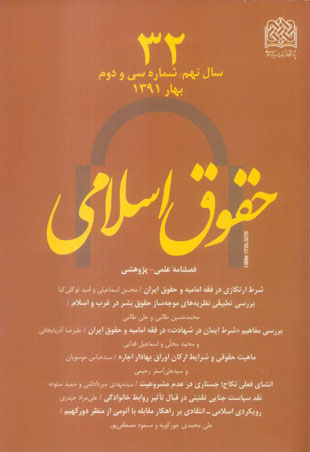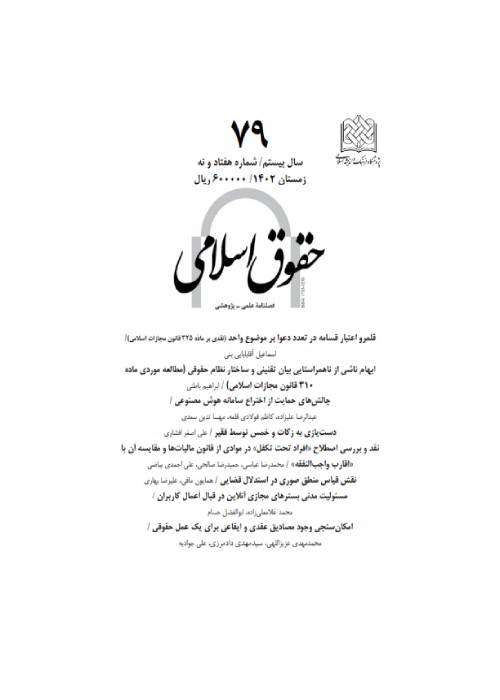فهرست مطالب

فصلنامه حقوق اسلامی
سال نهم شماره 1 (پیاپی 32، بهار 1391)
- 230 صفحه، بهای روی جلد: 60,000ريال
- تاریخ انتشار: 1391/02/13
- تعداد عناوین: 7
-
-
Page 7Some terms are so popular in the contract that without which the contracts cannot be correctly construed. Such conditions are called “implicit” terms or provisos. Sometimes, that they are not explicitly stated is based on the previous agreement made between two parties (supposed terms); sometimes because of customs and practices, “presence” of a term is taken as granted in the contract (customary conditions) and, some still other times, presence of a term in the contract is necessary (legal terms). And some other times, it is fully clear that a term is a term and it needs not to be stipulated. Such terms are called, in jurisprudence, irtikazi*** terms. The various kinds of provisos have been discussed; no discussion, however, has been so far made about irtikazi terms and only some jurists have made uses of them to explain some juridical-legal issues. The irtikazi term is a term which has rooted in the minds of the parties to the contract even though they may be unaware of it; it is, however, a necessary part of the contract. This term is among correct ones and should be fulfilled. Some consequences of this term may be observed in issues such as unsaid defects, condition of virginity in the contract of marriage, option of loss, option of defect and the like within the scope of Imami jurisprudence and Iranian Law.Keywords: irtikazi term, proviso, customary irtikaz, tradition of the wise
-
Page 37“Human rights” are among those rights of which all human beings naturally (in other words, since they are human beings) enjoy. These rights are of three characteristics: inclusivity, paramount importance, and possibility of vindication. The theories justifying human rights in the West are in agreement that such rights have their roots in man’s nature; but concerning the point what which characteristic of the man’s nature may be a standard or a basis for such rights, these theories are in disagreement. Man’s essential inclination to good, human dignity, and man’s moral agency are among the most well-known standards to determine human rights in the West according to which these theories have been distinguished from each other. In spite of their fame, none of these opinions is scientifically suitable to defend legitimacy of these rights. On the other hand, the only theory to explain principles of human rights which may be defended is a novel theory which is based on the rational Islamic doctrines which is, in the present article, known as “the theory of inclination of the station of Universal Man”. According to this theory, human’s spiritual competence to attain the lofty station of Divine Vicegerency is the standard to determine human rights.Keywords: definition of human rights, characteristics of human rights, theories justifying human rights, natural law, human dignity, human moral agency, inclination to the station of Universal Man
-
Page 63One of the conditions mentioned in the Imami jurisprudence for the witness is “belief”. To fulfill needs of the time as well as (probably) to remove hardships relevant to the arguments posed to prove a case, the Civil Code of Iran has not considered “to be a Muslim” and “belief” as necessary conditions for the witness. After the victory of the Revolution, in the Article 115 of the Civil Procedure to which the rules of the Law of Civil Procedure have been referred, the legislator has not included the condition of “to be a Muslim” among conditions of witnesses. Mentioning the condition of “belief”, however, the legislator has tried to revive the tradition of the Imami jurists who did not accept the testimony of the disbeliever. To mention the condition of belief- of course as belief is interpreted by Imami jurists; according to them, only twelver Shi‘is are believers- will somehow weaken religious unity and, finally, it will disturb social unity. Nevertheless, it seems that the narrow interpretation posed by the well-known jurists may, on the basis of other standards and interpretations- be extended to cover the concept of “to be a Muslim”; for, there are considerable rational and transmitted arguments in this regard.Keywords: Imami jurisprudence, testimony, belief, Sunnis, people of the Book, will
-
Page 91Hire securities are among instruments for Islamic finance and its structure is based on the contract of hire; thus, the legal relations governing them should be specified. Thus, hire securities, in legal terms, are collections of legal relations which are, on the long run, of a combined legal nature and among such relations are the rights to be financial, transferable, follow the basic assets in terms of transferability or nontransferability, possibility of being used as a mortgage, to be an instrument showing the owner’s share in the basic asset of the securities and that they may be attached. To transfer these securities in the primary market, a combination of various contracts is required and to do so in the secondary market, the nature of the “sale of joint share” should be taken into account, and certain formalities should be observed. Because of the importance of protecting the rights of the owners of capital, the foundations participating in these securities should follow certain conditions in accord to the rules and their relation has been based on the various contracts. The present article is aimed to reply the question that which characteristics and legal effects follow the securities and what the legal nature of transfer of the securities in the primary and secondary markets is and what the conditions of the foundations of the hire securities.Keywords: hire securities, legal characteristics, legal nature, primary market, secondary market
-
Page 123Though many transactions are realized through mutual surrender (mu’atat) as well, Sunni and Shi’i jurists are of the opinion that one of the conditions for the contract of marriage to be right is verbal offer and acceptance. Also, the Article 1062 of the Civil Code, following the wellknown opinion, has accepted offer and acceptance in words in the contract of marriage. Thus, the present writing is a juridical-legal study about feasibility of a marriage which is based on the mutual surrender and reasons that why it may be right or wrong. The product of this study which is based on the judgment about documents of discussion is that reasons introduced fail to prove enforcement of a marriage which is based on mutual surrender in the stage of occasion. In addition, the inferential (ijtihadi) reasons show that it is evidently wrong. And even if decline is assumed, what that is required by juridical reasons is that the existing status (non-realization of the right religious cause by the present declaration of marriage) should be maintained.Keywords: declaration of marriage, marriage based on mutual surrender, rightness, wrongness
-
Page 151There is no doubt that family relations are of influence on Iranian Penal Law. But there are certain questions: “are the way in which and the extent to which these relations influence penal rules based on an informed, reasonable approach which is, in turn, founded on scientific principles and in accord to the practical requirements or are they far from a penal-legislative policy and only a translation of juridical sources and foreign laws without an understanding of and taking into account the influence of this point [penal-legislative policy]?” To reply these questions, the author has studies the penal-legislative policy when influenced by family relation from three respects: The extent to which and the way in which family relations influence testimonies of relatives, jurisdiction, execution of religious punishment (hadd) by father and husband, that father is not punished for [crimes he committed toward] his offspring, in terms of correspondence between legal and juridical approaches; Legal corrections stemmed from family relations in elimination of paternal guarantee in quasi intentional murder in punishing those who commit incest, not taking into account relativeness as a cause to stop prosecution or exempt someone of punishment, change in the structure of paternal relatives [of a murderer], competence of the judicial authority, limitation of the scope of murder in penal cooperation, in terms of a purposeful, sustainable, and wellfounded legal approach toward family relations. The way in which family relations influence cases such as financial interactions, nakedness [in presence of each other], and absence in legal deadlines in terms of similarity between basis and the scope of impact exerted by relativeness on penal laws.Keywords: penal policy, family relations, relativeness, lineage, relationship by marriage, fosterage
-
Page 181Emile Durkheim thinks that anomie is a product of sudden change which simultaneous with great prosperities of the industrial period or a rooted and traditional depression of norms has made the cultural values of the society like puppets of the young modernization. He thinks human is an insatiable being who has lived a life of grudge and seeks for what he does not have and unusual growth of anomie destroys the collective conscience and individual, class, and group consciences will grow. And this means exactly weakened social supervisions and increased crimes. Durkheim thinks that the only way to control man’s grudge nature should be sought for in the invisible hands of the society and social supervisions. A society in which order governs on the basis of strengthening its social supervisions, the song of the angel of justice will be sung in man’s life. On the other hand, propositions and doctrines of the religion of Islam (under the motto of “Surely I know that which ye know not” and while describing man’s Divine innate nature), reject the idea of “the first sin”; and while emphasizing the positive impact of social supervisions to fight against crimes and phenomena such as anomie, they focus on internal supervisions.Keywords: anomie, collective conscience, crime, religion, social supervision, internal supervision


